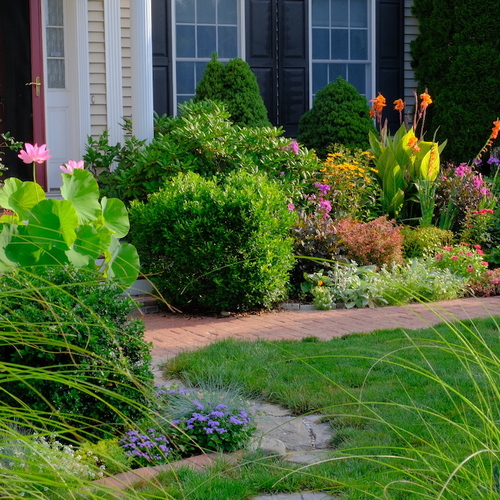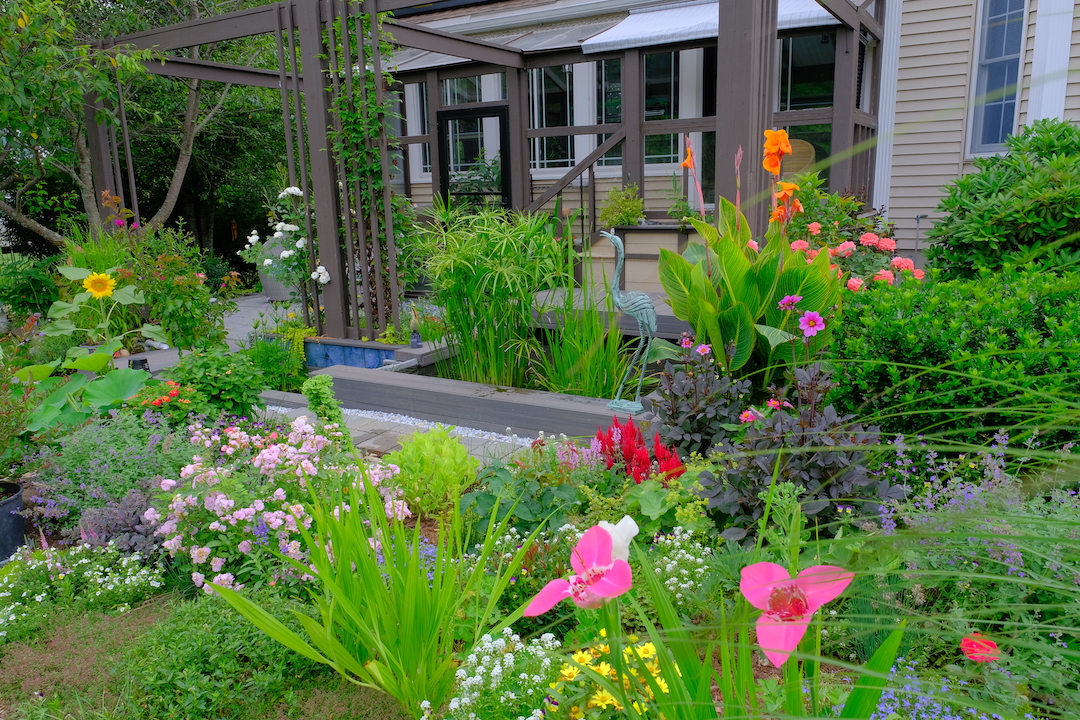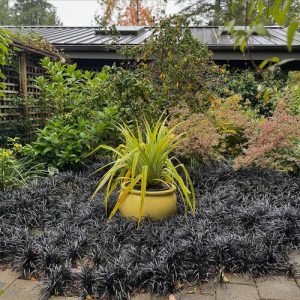
We’re in Massachusetts today, visiting Tingshu Hu’s garden. Tingshu has been sharing scenes from her garden at different times of the year. Today we’ve moved into July and are looking at the summer scenes from her front garden.
The Canna ‘Striata’ (Zones 8–10 or as a tender bulb) started to bloom in early July. To its right is Rosa ‘America’, planted in early May. It was supposed to start blooming in June, but the first buds were killed by the hard freeze on May 19 and so the first blooms were delayed by several weeks. After these blooms, a new shoot emerged from the ground and grew to reach the top of the pergola.
 Looking across the patio from the west side, beside the center post of the pergola Rosa ‘Iceberg’ also started to bloom with white flowers. It was planted at a wrong spot and stayed there for several years, sad and barely surviving. When the post for the new pergola was erected, we thought it must be a right spot for Rosa ‘Iceberg’ and moved it there. It really liked the new sunny waterfront spot very much and put forward lots of new growth and flowers. At the right-side flower bed, under the Yoshino cherry tree (Prunus × yeodoensis, Zones 5–8) are some houseplants enjoying a summer vacation. Clivia is blooming with orange flowers, and Hoya also bears some globe flowers. The pink flowers are rain lily (Zephyranthes sp.).
Looking across the patio from the west side, beside the center post of the pergola Rosa ‘Iceberg’ also started to bloom with white flowers. It was planted at a wrong spot and stayed there for several years, sad and barely surviving. When the post for the new pergola was erected, we thought it must be a right spot for Rosa ‘Iceberg’ and moved it there. It really liked the new sunny waterfront spot very much and put forward lots of new growth and flowers. At the right-side flower bed, under the Yoshino cherry tree (Prunus × yeodoensis, Zones 5–8) are some houseplants enjoying a summer vacation. Clivia is blooming with orange flowers, and Hoya also bears some globe flowers. The pink flowers are rain lily (Zephyranthes sp.).
 More houseplants are growing around the trunk of a Yoshino cherry. The Queen of the Night cactus’s (Epiphyllum oxypetalum) pink-white flower continued to bloom in the early morning. The small white flowers are those of a climbing jasmine (Jasminum sambac), and the pink-red flowers are crown of thorns (Euphorbia milii).
More houseplants are growing around the trunk of a Yoshino cherry. The Queen of the Night cactus’s (Epiphyllum oxypetalum) pink-white flower continued to bloom in the early morning. The small white flowers are those of a climbing jasmine (Jasminum sambac), and the pink-red flowers are crown of thorns (Euphorbia milii).
 Pink rain lily flowers (Zephyranthes grandiflora, Zones 8–10) are my favorite (from childhood memory). I keep them in the greenhouse over the winter.
Pink rain lily flowers (Zephyranthes grandiflora, Zones 8–10) are my favorite (from childhood memory). I keep them in the greenhouse over the winter.
 In the front are two pink Tigridia flowers (Zones 8–10) planted as an annual. The rose bush with clusters of pink flowers is ‘Pretty Polly Lavender’ (Zones 4–10). The dark-leaved dahlia with purple flowers (Dahlia hybrid, Zones 8–10 or as a tender bulb) is just starting to bloom. The white flowers of an Iceberg rose peek from the bars of the pergola. The sunflower (Helianthus annuus, annual) grew from self-seeding and found a perfect spot by herself.
In the front are two pink Tigridia flowers (Zones 8–10) planted as an annual. The rose bush with clusters of pink flowers is ‘Pretty Polly Lavender’ (Zones 4–10). The dark-leaved dahlia with purple flowers (Dahlia hybrid, Zones 8–10 or as a tender bulb) is just starting to bloom. The white flowers of an Iceberg rose peek from the bars of the pergola. The sunflower (Helianthus annuus, annual) grew from self-seeding and found a perfect spot by herself.
 This garden bed by the front door features these flowering plants: dahlia, phlox (Phlox paniculata, Zones 5–9), burning heart false sunflower (Heliopsis helianthoides, Zones 3–9), ‘Gold Mound’ spirea (Spiraea japonica ‘Gold Mound’, Zones 5–8), roses, canna, zinnias (Zinnia × marylandica, annual), and lady’s mantle (Alchemilla mollis, Zones 3–8). The white alyssums (Lobularia maritima, Zones 9–11 or as an annual) grow from self-seeding.
This garden bed by the front door features these flowering plants: dahlia, phlox (Phlox paniculata, Zones 5–9), burning heart false sunflower (Heliopsis helianthoides, Zones 3–9), ‘Gold Mound’ spirea (Spiraea japonica ‘Gold Mound’, Zones 5–8), roses, canna, zinnias (Zinnia × marylandica, annual), and lady’s mantle (Alchemilla mollis, Zones 3–8). The white alyssums (Lobularia maritima, Zones 9–11 or as an annual) grow from self-seeding.
 Lotus (Nelumbo nucifera, Zones 5–11) is grown in a pot in front of the door. Two flowers are blooming in the morning sun.
Lotus (Nelumbo nucifera, Zones 5–11) is grown in a pot in front of the door. Two flowers are blooming in the morning sun.
 Looking from across the drought-tolerant garden, the garden gate is at the back.
Looking from across the drought-tolerant garden, the garden gate is at the back.
 This dreamy color palette in the drought-tolerant garden includes catmint (Nepeta × faassenii, Zones 3–8), ‘Firefly Peach Sky’ yarrow (Achillea ‘Firefly Peach Sky’, Zones 3–8), coreopsis (Coreopsis verticillata, Zones 3–9), and the rose ‘Pretty Polly Lavender’ (Zones 4–10).
This dreamy color palette in the drought-tolerant garden includes catmint (Nepeta × faassenii, Zones 3–8), ‘Firefly Peach Sky’ yarrow (Achillea ‘Firefly Peach Sky’, Zones 3–8), coreopsis (Coreopsis verticillata, Zones 3–9), and the rose ‘Pretty Polly Lavender’ (Zones 4–10).
 Low-growing plantings along the walkway include bright-colored nasturtium (Tropaeolum majus, Zones 9–11 or as an annual), ground-cover roses, and rose campion (Lychnis coronaria, Zones 4–8) flowers that joined the existing white flowers of alyssum from self-seeding. I had to pull out some alyssums to make room for other plants.
Low-growing plantings along the walkway include bright-colored nasturtium (Tropaeolum majus, Zones 9–11 or as an annual), ground-cover roses, and rose campion (Lychnis coronaria, Zones 4–8) flowers that joined the existing white flowers of alyssum from self-seeding. I had to pull out some alyssums to make room for other plants.
We’re going to see more of July in Tingshu’s back garden tomorrow.
Have a garden you’d like to share?
Have photos to share? We’d love to see your garden, a particular collection of plants you love, or a wonderful garden you had the chance to visit!
To submit, send 5-10 photos to [email protected] along with some information about the plants in the pictures and where you took the photos. We’d love to hear where you are located, how long you’ve been gardening, successes you are proud of, failures you learned from, hopes for the future, favorite plants, or funny stories from your garden.
Have a mobile phone? Tag your photos on Facebook, Instagram or Twitter with #FineGardening!
Do you receive the GPOD by email yet? Sign up here.





